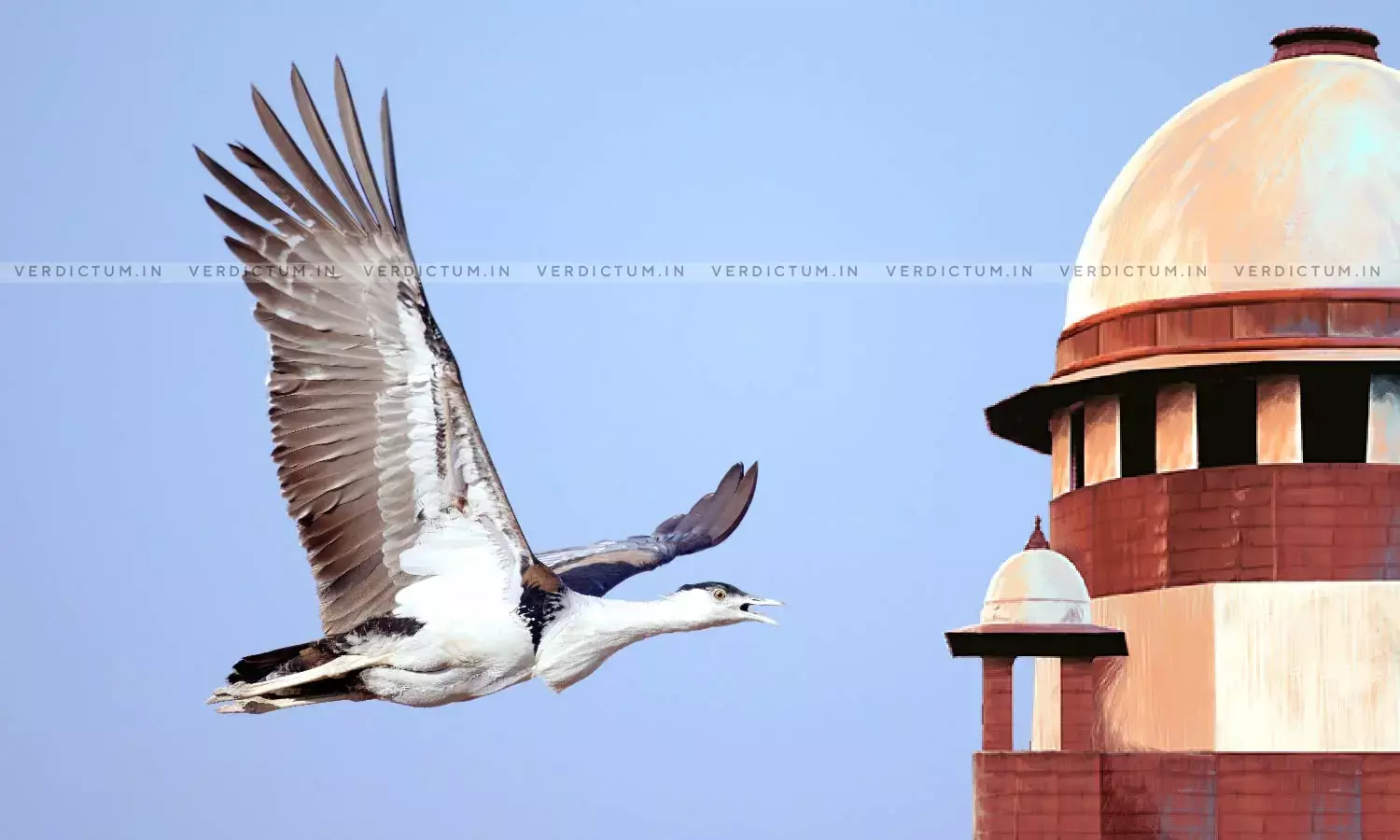Conserving Great Indian Bustard: Committee Seeks SC Directions For Expediting Underground Laying Of Transmission Lines
A committee constituted by the Supreme Court on saving the Great Indian Bustard (GIB) has urged the apex court to pass directions for expediting the underground laying of power transmission lines in priority and potential GIB habitats in Rajasthan and Gujarat.
The GIB considered India's most critically endangered bird species, is especially found in Rajasthan and Gujarat, and per the 2021 report of the International Union for Conservation of Nature (IUCN), they are on the verge of extinction with hardly 50 to 249 of them alive.
The apex court, which is hearing a PIL on saving the GIB, had earlier directed the governments of Gujarat and Rajasthan to replace overhead electric cables with underground power cables, wherever feasible, and install bird diverters in priority areas where the birds live.
In a status report filed in the apex court, the committee has given details of the applications received for the assessment of feasibility. It said the committee has received applications for about 3,260 km power line in the GIB area of Rajasthan and has reached a decision for about 2,356 km line, out of which 98 percent of line length has been ratified for overhead laying with bird flight diverters, additional mitigation measures such as horizontal stringing and minor realignments wherever required.
The report said two percent of line length has not been ratified for overhead laying since they are proposed through the prioritized GIB area that is critical for the survival of the species and has recorded recent mortalities of GIB, and, therefore, needed to be safeguarded from further expansion of overhead transmission lines. It said that similarly, the committee has received applications for about 4,132 km power line in GIB Area of Gujarat and has reached a decision for about 4,094 km line, out of which 82 per cent of line length has been ratified for overhead laying with bird flight diverters and additional mitigation measures.
"The committee sent a communication dated May 3, 2021 to concerned agencies/respondents requesting applications of existing transmission lines for which exemption from under grounding is to be sought," it said. The report said the committee has not received any application for existing transmission lines in Rajasthan to be exempted from under-grounding.
It said to the best of the knowledge of committee members, no existing transmission line in Rajasthan and only a 10 km segment of a much-longer 66 KV transmission line in Gujarat have been laid underground, whereas the length of transmission lines (installed before the SC order) that have been marked with bird flight diverters is below 25 percent of the total line length.
"Given the high mortality risk and recent evidence of two GIB mortalities in the prioritised area of Rajasthan, and frequent movements of both species of bustards in the prioritised area of Gujarat, the above members request the SC for necessary directions to concerned agencies for expediting the underground laying of transmission lines inside the priority areas of Rajasthan and Gujarat," the report said.
While hearing the matter on November 30 last year, the apex court had mooted the idea of launching 'Project GIB' on the lines of 'Project Tiger', which was started in 1973 to save the big cats, and sought the government's view on the proposal.
A bench headed by Chief Justice D Y Chandrachud had also sought reports from the chief secretaries of Rajasthan and Gujarat in six weeks on installation of bird diverters in priority areas and assess the total length of transmission lines in the two states where under-grounding of electric wires have to be done to ensure the birds do not die of electrocution.
The Central government launched 'Project Tiger' on April 1, 1973, to promote the conservation of the big cat whose population had dipped alarmingly.
The apex court had earlier set up a three-member committee to assess the feasibility of laying high-voltage underground power cables.
The committee comprises scientists Rahul Rawat, Sutirtha Dutta, and Devesh Gadhavi. The PIL has sought the court's directions for an urgent emergency response plan to protect and ensure the recovery of the numbers of the endangered GIB and Lesser Florican (LF).
With PTI Inputs




